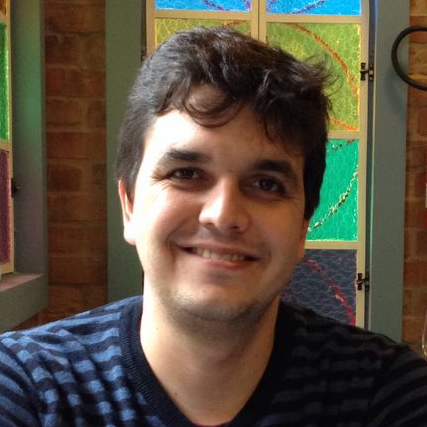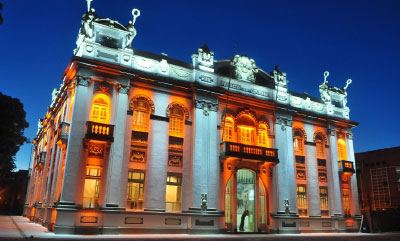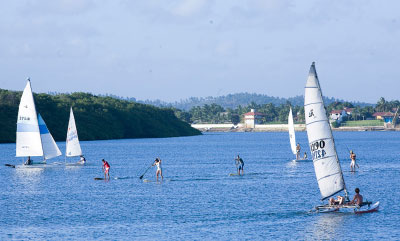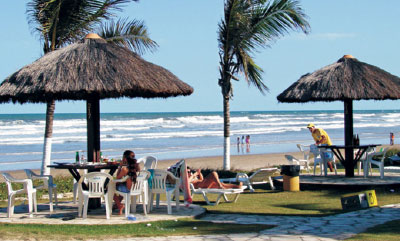
From May 20th to May 24th, 2019
DAYS UNTIL THE EVENT
The research in Information Systems (IS) is aiming to understand Computing as a means or instrument for solving problems
in the real world, society and organizations. The Brazilian Symposium on Information Systems (SBSI) is the annual meeting of the IS community of the Computational Brazilian Society (SBC), constituting an event to present
scientific papers and discuss topics of IS, bringing together students, researchers, professionals and entrepreneurs
related to Information Systems.
In its 15th edition, SBSI 2019 will take place in the city of Aracaju, Sergipe, under the coordination of the ITP (Institute of Research and Technology) and the Computing Department of Universidade Tiradentes
(UNIT). The theme of the event for this year is
"The complexity of modern Information Systems". Given that Information Systems plays an important role in science, economy and society, in distinct applications, the basic understanding of complexity in these systems is fundamental for their conception and maintenance.
Such complexity comes from the different dimensions of engineering and management in information systems, not only
technically, but also socially and commercially. Considering this context, several resources and processes are involved in the lifecycle of these systems, as well as on an interaction with other systems, factors and artifacts.
It will discuss the advances and perspectives in IS considering it's complexity and broad applications to the most distinct domains related to engineering of complex systems.
One example of these system are the software ecossystems and Systems of Systems, which has become a highlight of studies in the last decade, creating discussions about some of the challenges faced by IS researchers.
Scientific papers are expected to contribute in new ways to research development, industry experience reports, education in IS and case studies; all surrounding the Information System subject and related to various other topics of interest of the symposium. We would like to specially invite the community to stand for main event theme "The complexity of modern Information Systems".
Article registration: October 22nd November 19th, 2018
- Submission of articles (summary and article): October 29th November 19, 2018*
- 1st stage of evaluation (summary) - Notification to the Authors: December 14th, 2018
- 2nd stage of evaluation (article) - Notification to the Authors: February 22nd, 2019
- Delivery of the Final Version: March 1st March 08th, 2019
- SBSI 2019 - Event occuring between: May 20th to May 24th, 2019
* Please note that non-main track events have different submission dates.
Topics of Interest
Contributions are expected to address the main theme of the event - "The complexity of modern Information Systems", as well as the major themes on IS research challenges defined by the Information Systems research community. Click here to access the E-Book.
* Systems-of-Information Systems
* IS in the open world
* Complexity of Information Systems
* Sociotechnical view of Information Systems
Other topics are also expected, but not limited to:
* Service Oriented Architecture and Web Services
* Human and social aspects in IS
* Business Intelligence & Analytics
* Mobile, ubiquitous computing and Internet of things in IS
* Open and connected data, open systems
* Education of/in IS
* Software and IS Ecosystems, Systems of Systems and of IS
* Knowledge and organizational learning management
* Management of people in IS
* Management of processes in IS (management methodologies, process repositories, process modeling, social BPM, knowledge-intensive processes, process adaptation, context-sensitive processes)
* Business and IT Governance
* Innovation with/in IS
* Integration of information and applications
* Human-Computer Interaction in IS
* Methodologies and approaches for IS engineering
* Social media in business and society
* Modeling and paradigms of IS development (data, systems/applications, agents, aspects, components, agile methods,...)
* Operational research and decision models in business
* Strategic planning of systems and IT
* Preservation of information and digital memory
* IS Quality
* Representation of business information, data management and metadata in organizations, ontologies
* Security of/in IS
* Intelligent IS (intelligent agents, genetic algorithms, machine learning, data mining, formal models, ontologies, automated reasoning, neural networks, knowledge representation)
* IS for government (transparency, open data, interoperability, government ecosystems)
* Decision support systems
Main Track Committee
Rodrigo Santos (UNIRIO) e Davi Viana (UFMA)
Scheila de Ávila e Silva (UCS)
Fábio Rocha (UNIT) e Igor Vasconcelos (UNIT)
| MONDAY - MAY 20, 2019 | |||||
|---|---|---|---|---|---|
| Material delivery and registration (BUILDING G - Entrance) |
|||||
| Lab 1 | Lab 2 | Building G - Room 4 | Building G - Room 6 | Building G - Room 18 | |
| 09:00-10:30 | EISI (including tools) |
Main Track (Technical Session 1) |
WICSI (Section 1) |
||
| 10:30-11:00 | Coffee Break (CoDeSii) |
||||
| 11:00-12:30 | EISI (including tools) |
Main Track (Technical Session 2) |
WICSI (Section 2) |
||
| 12:30-14:30 | Lunch | ||||
| 14:30-16:00 | Minicourse 1 (TRM) | Minicourse 2 (SoIS) | EISI (including tools) |
Main Track (Technical Session 3) |
WICSI (Section 3) |
| 16:00-16:30 | Coffee Break (CoDeSii) |
||||
| 16:30-18:00 | Minicourse 1 (TRM) | Minicourse 2 (SoIS) | EISI (including tools) |
Main Track (Technical Session 4) |
WICSI (Section 4) |
| 18:00-19:00 | |||||
| 19:00-21:00 | Auditorium - Building G SBSI 2019 Opening + Cultural Presentation |
||||
| Technical Session 1 (ST1) - Project Management Aspects: |
||
| 1. | Kairós: Predictive Model Based On Context Histories For Time Management In Projects | Felipe Rodrigues, Alexsandro Filippetto, Jorge Luis Barbosa (UNISINOS) |
| 2. | Level UP: Mapping Hard Skills of IT Practitioners to support the Project Management | Vanessa Milon (Fundação Paulo Feitosa), Ricardo Araújo (Fundação Paulo Feitosa), Osenias Oliveira (Fundação Paulo Feitosa), Andréia Vieira (Fundação Paulo Feitosa), Adriano Mendes (ASGD Partners), Luis Braga (Fundação Paulo Feitosa), Bruna Ferreira (Fundação Paulo Feitosa) |
| 3. | Resource Demand Management in Java Ecosystem | Thiciane Silva (UNIT), Fabio Rocha (UNIT), Rodrigo Santos (UNIRIO) |
| Technical Session 2 (ST2) - Decision Support Systems (1): |
||
| 1. | Location-Allocation of Police Vehicles under a Multi-period Perspective | Amarildo de Lucena (UFRPE), Silvana Bocanegra (UFRPE), Flavius da Luz e Gorgônio (UFRN) |
| 2. | A Framework to Support Experts in the Study of Energy Efficiency in Urban Trains | Mayrton Queiroz, Ruan Palmeira, Felipe Melo, Rodrigo Daniel, Icaro Rique, Augusto Guimarães, Marcelle Martins, Natasha Lino (UFPB) |
| 3. | Building a conceptual architecture and stakeholder map of a system-of-systems for disaster monitoring and early-warning: A case study in Brazil | Flávio Horita (UFABC), Donna Rhodes (Massachusetts Institute of Technology), Thiago Inocêncio (UFABC), Gustavo Gonzales (UFABC) |
| Technical Session 3 (ST3) - Requirements and Models: |
||
| 1. | Improvements on diagnostic assessment questionnaires of Maturity Level Management with feature selection | Bruno Prece, Edson Pacheco, Rodolfo Barros, Sylvio Barbon Jr. (UEL) |
| 2. | LifeReview: A model for monitoring people with anxiety disorder | Leonardo Paula, Jorge Barbosa (UNISINOS) |
| 3. | Software Requirements for the Design of Gamified Applications for Time Management and Tasks for Children and Adolescents with ADHD | Tássio Gomes (UFAL), Wilk Oliveira (USP), Leonardo Marques (UFAL), Patrick Brito (UFAL), Ig Bittencourt (UFAL) |
| Technical Session 4 (ST4) - Sentiment Analysis: |
||
| 1. | Enrichment of dictionaries to improve the automatic classification of feelings in postings related to the use of systems | Afonso Lima, Marília Mendes, Lívia Rafael (UFC) |
| 2. | Sequential Sentiment Pattern Mining to Predict Churn in CRM Systems: A Case Study with Telecom Data | Thiago Paiva Pimentel, Ronaldo Ribeiro Goldschmidt (IME) |
| 3. | Opinion Mining in Facebook Regional Discussion Groups A Case Study to Identify Health, Education and Security Posts in Discussion Groups | Leonardo Augusto Sápiras, Rodrigo Antônio Weber (Faculdades Integradas de Taquara) |
| TUESDAY - MAY 21, 2019 | |||||
|---|---|---|---|---|---|
| Lab 1 | Lab 2 | Building G - Room 4 | Building G - Room 60 | Building G - Room 18 | |
| 09:00-10:30 | Main Track (Technical Session 5) |
Master Class 1 Fundamentals of IS (Prof. Marcelo Fornazin) |
WTDSI (Section 1) |
||
| 10:30-11:00 | Coffee Break (CoDeSii) |
||||
| 11:00-12:30 | Main Track (Technical Session 6) |
Master Class 1 Fundamentals of IS (Prof. Marcelo Fornazin) |
WTDSI (Section 2) |
||
| 12:30-14:30 | Lunch | ||||
| 14:30-16:00 | Minicourse 3 (ECI) | Minicourse 4 (AMCI) | Main Track (Technical Session 7) |
WTDSI (Section 3) |
|
| 16:00-16:30 | Coffee Break (CoDeSii) |
||||
| 16:30-18:00 | Minicourse 3 (ECI) | Minicourse 4 (AMCI) | Main Track (Technical Session 8) |
WTDSI (Section 4) |
|
| 18:00-19:00 | |||||
| Technical Session 5 (ST5) - Decision Support Systems (2): |
||
| 1. | Decision Support System for Precision Livestock: Machine Learning Prediction- Based Module for Stocking Rate Adjustment | Leonardo Schulte (UNIPAMPA), Naylor Perez (Embrapa Pecuária Sul), Leonardo Pinho (UNIPAMPA), Gustavo Trentin (Embrapa Pecuária Sul) |
| 2. | A Model for Predicting Disapproval of Apprentices in Distance Education Using Decision Tree | João Ferreira (IFAM), André Aloise (IFAM), Vítor Matter (UNISINOS), Jorge Barbosa (UNISINOS), Sandro Rigo (UNISINOS), Kleinner Oliveira (UNISINOS) |
| 3. | Investigating Social Information Systems: A Systematic Mapping Study | Nadja Antonio (UNIRIO), Juliana Fernandes (UNIRIO), Sandro Freire (UNIRIO), Marcelo Fornazin (UFF & UNIRIO), Rodrigo Santos (UNIRIO) |
| Technical Session 6 (ST6) - Software Engineering for Information Systems: |
||
| 1. | Reducing the execution time of unit tests of smart contracts in blockchain platforms | Hallan Medeiros, Patrícia Vilain, Vilmar Pereira Júnior (UFSC) |
| 2. | Towards a hybrid approach to measure similarity between UML models | Lucian Gonçales, Kleinner Farias, Vinicius Bischoff (UNISINOS) |
| 3. | Identifying Technical Debt through a Code Comment Mining Tool | Mário Farias (UFS), Railan Xisto (UFS), Marcos Santos (UFS), Raphael Fontes (UFS), Methanias Colaço Júnior (UFS), Rodrigo Spínola (UNIFACS & UESB), Manoel Mendonça (UFBA) |
| Technical Session 7 (ST7) - Knowledge and Information Discovery (1): |
||
| 1. | Linguistic Pattern Mining for Data Analysis in Microblog Texts using Word Embeddings | Danielly Sorato, Renato Fileto (UFSC) |
| 2. | A Deep Learning Approach to the Malware Classification Problem using Autoencoders | Dhiego Pinto, Julio Cesar Duarte, Ricardo Sant’Ana (IME) |
| 3. | Application of Clustering Algorithms for Discovering Bug Patterns in JavaScript | Charles Macedo, André Ruela, Karina Delgado (USP) |
| Technical Session 8 (ST8) - Social Media and Society: |
||
| 1. | Deciding among Fake, Satirical, Objective and Legitimate news | Janaína Morais, Hugo Abonizio, Gabriel Tavares, André Fonseca, Sylvio Barbon Jr. (UEL) |
| 2. | Open Data Extraction, Transformation, and Loading as a Tool for Supporting 2018 Elections' Voters | Nélson Passos, Ariel Rodrigues, Hendrik Macedo, Bruno Prado, Gilton Silva, Leonardo Matos (UFS) |
| 3. | Design Science Research to design a conceptual model about prosopographic information related to politicians. | José Barroso Júnior (UNIRIO), Mariano Pimentel (UNIRIO), Vanessa Nunes (UnB), Claudia Cappelli (UFRJ) |
Resumo: O objetivo desta aula é apresentar fundamentos teóricos e metodológicos para pesquisa em Sistemas de Informação (SI) a partir de um olhar interdisciplinar que articula conhecimentos das áreas tecnológicas e das ciências sociais. Iniciamos com um posicionamento histórico da sociedade da informação em comparação à sociedade industrial para evidenciarmos a atual centralidade dos SI nas organizações. Em seguida apresentaremos conceituações dos SI como objeto de pesquisa levando em conta aspectos técnicos, econômicos e sociais. Por fim, apresentaremos tópicos, paradigmas de pesquisa e teorias para a investigação dos SI levando em conta conhecimentos de tecnologia, pessoas e organizações.

Marcelo Fornazin é Professor Adjunto no Instituto de Computação da Universidade Federal Fluminense (UFF). Doutor em Administração pela Escola Brasileira de Administração Pública e de Empresas da Fundação Getúlio Vargas (EBAPE/FGV), possui Bacharelado (2006) e Mestrado (2008) em Ciência da Computação pela Universidade Estadual Paulista "Júlio de Mesquita Filho" (UNESP). Integrante do Grupo Temático Informação, Saúde e População da Associação Brasileira de Saúde Coletiva (GTISP/Abrasco), atua também no Programa de Pós-Graduação em Informática da Unirio (PPGI-Unirio) e no Programa de Pós Graduação em Ciência da Informação IBICT-UFRJ. Tem experiência na área de Tecnologia da Informação, com ênfase em Gestão de Tecnologia da Informação, Governo Eletrônico e Computação Social. Atua principalmente nos seguintes temas: planejamento e gestão de TI, avaliação e projetos e políticas públicas de TI, desenvolvimento de sistemas de computação, desenvolvimento de soluções de informática na saúde e na educação.
| WEDNESDAY - MAY 22, 2019 | |||||
|---|---|---|---|---|---|
| Building G - Room 6 | Building G - Room 4 | Building G - Room 18 | Building G - Room 60 | ||
| 09:00-10:30 | Main Track (Technical Session 9) |
Main Track (Technical Session 10) |
Master Class 2 Design Science Research (Prof. Mariano Pimentel) |
||
| 10:30-11:00 | Coffee Break | ||||
| 11:00-12:30 | Main Track (Technical Session 11) |
Main Track (Technical Session 12) |
CTDSI/CTCCSI (TCC) |
Master Class 2 Design Science Research (Prof. Mariano Pimentel) |
|
| 12:30-14:30 | Lunch | ||||
| 14:30-16:00 | Main Track (Technical Session 13) |
Main Track (Technical Session 14) |
CTDSI/CTCCSI (DSc) |
||
| 16:00-16:30 | Coffee Break | ||||
| 16:30-18:00 | Auditorium - Building G Keynote International: Prof. Rafael Capilla |
||||
| 18:00-18:30 | Awards SBSI/Main Track and CTDSI/CTCCSI | ||||
| 19:30-22:30 | Restaurant in Orla de Atalaia Confraternization dinner |
||||
| Technical Session 9 (ST9) - Social Networks: |
||
| 1. | Information Diffusion in Social Networks: a recommendation model in the educational context | Felipe Braz, Victor Ströele, Fernanda Campos (UFJF) |
| 2. | CrowdRec: Development of a prototype system for crowdsourcing platforms using Google Venture | Tiago Ferreira, Alisson Zanetti, Fernando Costella, Silvano Silva, Alexandre Zanatta, Ana Marchi (Universidade de Passo Fundo) |
| 3. | A Topological Data Evolution Based Method to Predict Links in Social Networks | Érick Florentino, Argus Cavalcante, Ronaldo Goldschmidt (IME) |
| Technical Session 10 (ST10) - Human and Social Aspects: |
||
| 1. | How personality traits influences quality of software developed by students | ANDERSON BARROSO (UNIT), KLEBER PRADO (UFS), MICHEL SOARES (UFS), ROGÉRIO DO NASCIMENTO (UFS) |
| 2. | On the Effects of Developers' Intuition on Measuring Similarity Between UML Models | Lucian Gonçales, Kleinner Farias, Vinicius Bischoff (UNISINOS) |
| 3. | UMLCollab: A hybrid approach for collaborative modeling of UML models | McLyndon Xavier, Kleinner Farias, Jorge Barbosa, Lucian Gonçales, Vinicius Bishoff (UNISINOS) |
| Technical Session 11 (ST11) - Process Modeling and Analysis: |
||
| 1. | Comparing Concept Drift Detection with Process Mining Tools | Nicolas Omori (UEL), Gabriel Tavares (UEL), Paolo Ceravolo (Università degli Studi di Milano), Sylvio Barbon Jr. (UEL) |
| 2. | A Case Study of Process Mining in Auditing | Flavia Maria Santoro (UERJ), Thais Barboza (UNIRIO), Kate Revoredo (UFRJ), Rosa Costa (UERJ) |
| 3. | Systematic Literature Review on BPMN-based Process Adaptation Approaches | Raquel Pillat, Renata Santos, Toacy Oliveira (COPPE/UFRJ) |
| Technical Session 12 (ST12) - Optimization and Applications: |
||
| 1. | Traveling Salesperson Problem with Hotel Selection: A systematic review of the literature | Marques Sousa (IFSP), Luiz Satoru Ochi (UFF), Simone Martins (UFF) |
| 2. | Efficient Hyperparameter Optimization of Convolutional Neural Networks on Classification of Early Pulmonary Nodules | Lucas Lima (UFAL), José Ferreira Junior (USP), Marcelo Oliveira (UFAL) |
| 3. | Deep Neural Networks Applied to User Recognition Based on Keystroke Dynamics: Learning from Raw Data | Marco Cruz, Ronaldo Goldschmidt (IME) |
| Technical Session 13 (ST13) - Interoperability, Data and Ecosystems: |
||
| 1. | A Conceptual Framework for Pragmatic Interoperability | Elivaldo Ribeiro, Erasmo Monteiro, Daniela Claro, Rita Maciel (UFBA) |
| 2. | Human-Computer Interaction Factors in Software Ecosystems: A Systematic Mapping Study | Mariana Santos (UFVJM), Juliana Fernandes (UNIRIO & IFPI), Maria Villela (UFVJM), Rodrigo Santos (UNIRIO) |
| 3. | Louvre: A Framework for Metadata Curation in Data Ecosystem | Marcelo Oliveira, Bernadette Lóscio (UFPE) |
| Technical Session 14 (ST14) - Systems and Software Product Lines: |
||
| 1. | Towards a semiautomatic tool to support the integration of feature models | Vinicius Bischoff, Kleinner Farias, Lucian Gonçales, Jorge Barbosa (UNISINOS) |
| 2. | Visualizing Commonalities and Variabilities in a Software Product Family | Denise Costa, Pedro Santos Neto (UFPI) |
| 3. | Requirement Reuse in Business Processes Lines | Doglas Sorgatto, Débora Paiva, Maria Cagnin (UFMS) |

Rafael Capilla is Associate Professor at Rey Juan Carlos University of Madrid. His research focuses on Software Architecture, Software Product Line Engineering, Dynamic Variability and Software Sustainability among other topics. He was co-editor and co-suthor of the Springer book on Systems and software Variability Management (2013) with Jan Bosch and Kyo-Chul Kang.
Rafael participated in several EU and Spanish research and development projects and he is a regular reviewer of well-known international Journals and Magazines (TOSEM, JSS, TSE, IST, SCP, Computer, Software). He is co-author of more than 90 conference and journal papers, and book chapters, and he has been guest co-editor in eight special issues for JSS, REJ, JSEP and SOFTWARE. Rafael acted as General Chair of international conferences like CMSR2010, ICSR2018 and VAMOS2018 and co-chaired several workshops (R2PL2006, DSPL2017, ENSEMBLE2019). He is also a member of the IEEE Software boards initiatives team, Senior IEEE member and coordinator of IEEE Spain Technical chapters. From Jan-April 2019, has been visiting professor and researcher at Chalmers University of Technology (Sweden). Web: https://www.researchgate.net/profile/Rafael_Capilla
From Systems-of-Systems to Industry 4.0
AbstractThe notion of Systems-of-systems (SoS) is the modern term commonly used to engineer software-intensive systems, which are mainly formed by several complex constituents. However, the development of SoS suffer of problems like the emergent or unpredictable behavior that may arise when different sub-systems and platforms are connected. While integration and interoperability often drive to different forms of SoS organization and management, the complexity of modern complex systems must deal many different quality properties that must be satisfied. Such quality trade-offs often complicate architecting SoS in the large and in the small, from platform selection and integration to the automation of the SoS processes. Today, the increasing transition to an Industry 4.0 (I4.0 or I4) concept, automation and quality factors are two main drivers for the “new industrial revolution” and for handling the complexity of software factories. As “Software is eating the world”, in this talk we highlight the transition from current SoS practice to the main characteristics of I4.0, where interconnectivity, decentralized decisions and large volume of data are used to increase autonomy and automation of software development processes and integrated with cyber-physical systems (CPS). Such level of automated and optimized production of complex systems adds value to modern software factories, as “new connected ecosystems” where industrial sensors share the necessary data between SoS constituents and skilled users in order to embrace the “magic” of continuous development and delivery.
| THURSDAY - MAY 23, 2019 | |||||
|---|---|---|---|---|---|
| Building G - Room 6 | Building G - Room 4 | Auditorium - Building G | Building G - Room 60 | ||
| 09:00-10:30 | Main Track (Technical Session 15) |
Main Track (Technical Session 16) |
WQPSI Panel | FESI | |
| 10:30-11:00 | Coffee Break | ||||
| 11:00-12:30 | Main Track (Technical Session 17) |
Main Track (Technical Session 18) |
GranDSIBR (SBC) | FESI | |
| 12:30-14:30 | Lunch | ||||
| 14:30-16:00 | Main Track (Technical Session 19) |
Main Track (Technical Session 20) |
Moment with Keynotes | FESI | |
| 16:00-16:30 | Coffee Break | ||||
| 16:30-18:00 | Auditorium - Building G National Keynote: Prof. Julio Leite |
||||
| 18:00-22:00 | Auditorium - Building G IS Community Meeting |
||||
| Technical Session 15 (ST15) - Systems and Software Models: |
||
| 1. | A Domain-Sensitive Threshold Derivation Method | Allan Mori (UFMG), Gustavo Vale (University of Passau), Elder Cirilo (UFSJ), Eduardo Figueiredo (UFMG) |
| 2. | Hermes: A Natural Language Interface Model for Software Transformation | Michael Chagas (UNISINOS), Kleinner Farias (UNISINOS), Lucian Gonçales (UNISINOS), Lucas Kupssinskü (UNISINOS), João Gluz (IFRS) |
| 3. | Analyzing the Impact of Inter-smell Relations on Software Maintainability | Júlio Martins (UFC), Carla Bezerra (UFC), Anderson Uchoa (PUC-Rio) |
| Technical Session 16 (ST16) - Agile Methodologies: |
||
| 1. | An Agile Approach Applied to Intense Maintenance Projects | Gibeon Aquino Júnior, Andre Dantas (UFRN) |
| 2. | Towards an understanding of Value Creation in Agile Software Development | Geraldo Galindo Neto (UPE), Wylliams Santos (UPE), Roberta Fagundes (UPE), Tiziana Margaria (University of Limerick & Lero) |
| 3. | Vulnerability detection techniques and tools and their relationship to agile methods and software quality and service models | Lígia Santos, Edmir Prado, Marcos Chaim (USP) |
| Technical Session 17 (ST17) - SOA and Databases: |
||
| 1. | Semantic Enrichment of Services for Linked Data Provision in SOA | Bruno Oliveira, Alexis Huf, Ivan Salvadori, Frank Siqueira (UFSC) |
| 2. | Polyflow: A SOA for Analyzing Workflow Heterogeneous Provenance Data in Distributed Environments | Yan Mendes (UFJF), Regina Braga (UFJF), Victor Ströele (UFJF), Daniel de Oliveira (UFF) |
| 3. | Duplicate Management Using Graph Database Systems: A Case Study | Robinson Vaz (Controladoria Geral do Estado de Goiás), Jones Oliveira (UFG), Leonardo Ribeiro (UFG) |
| Technical Session 18 (ST18) - Startups and Ecosystems: |
||
| 1. | A Study on the Brazilian Public Software Portal Ecosystem Life Cycle and Collaboration | Vinicius Serva Pereira (UNIRIO), Renata Araújo (Universidade Presbiteriana Mackenzie), Rodrigo Santos (UNIRIO) |
| 2. | The Belo Horizonte Software Startups Ecosystem and its maturity | Pedro Almeida, Sandro Almeida (PUC Minas) |
| 3. | Software Startups Success Factors Study under the Entrepreneurial Perspective | Tatiany Godoi (UFPR), André Menolli (UENP & UEL), Gustavo Dionísio (UENP) |
| Technical Session 19 (ST19) - Information Systems and Applications: |
||
| 1. | Exploring Deep Features and Transfer Learning for Plant Species Recognition | Marcondes Feitoza, Wanderson Silva, Rodrigo Calumby (UEFS) |
| 2. | Impact analysis of model-based development in avionics software production | Gustavo Mottin, Josiane Porto (UNISINOS) |
| 3. | An Intelligent System to Enhance the Productivity and Sustainability in Soybean Crop Enterprises | Douglas Pereira (UTFPR), Pedro Bugatti (UTFPR), Fabrício Lopes (UTFPR), André Souza (Belagrícola Comércio e Representação de Produtos Agrícolas LTDA), Priscila Saito (UTFPR) |
| Technical Session 20 (ST20) - Information Systems and Society (1): |
||
| 1. | Semantic Enrichment of Web Data for the Provision of an Unified Data Repository of Brazilian Missing Persons | Jorão Gomes Junior, Nicolas Ferranti, Jairo Souza (UFJF) |
| 2. | ICT Governance: A View of Adoption of Best Practices in Enterprises of State of Sergipe | Claudio Silva, Quelita Ribeiro, Michel Soares, Rogério Nascimento (UFS) |
| 3. | A Study on the Design Thinking Approach in Universities | Edna Dias Canedo, Frederico Almeida (UnB) |
| FRIDAY - MAY 24, 2019 | ||||
|---|---|---|---|---|
| Building G - Room 6 | Building G - Room 4 | |||
| 09:00-10:30 | Main Track (Technical Session 21) |
Main Track (Technical Session 22) |
||
| 10:30-11:00 | Coffee Break | |||
| 12:30-14:30 | Lunch | |||
| 14:30-16:00 | Main Track (Technical Session 23) |
Main Track (Technical Session 24) |
||
| 16:00-16:30 | Coffee Break | |||
| 16:30-18:00 | Main Track (Technical Session 25) |
Main Track (Technical Session 26) |
||
| 18:00-19:00 | Auditorium - Building G Closing of SBSI 2019 |
|||
| Technical Session 21 (ST21) - Ontology, Data and Applications: |
||
| 1. | Outer-Tuning: an integration of rules, ontology and RDBMS | Rafael Oliveira (PUC-Rio), Fernanda Baião (PUC-Rio), Ana Carolina Almeida (UERJ), Daniel Schwabe (PUC-Rio), Sérgio Lifschitz (PUC-Rio) |
| 2. | Multirelation Association Rule Mining on Datasets of the Web of Data | Felipe Oliveira, Raquel Costa, Ronaldo Goldschmidt, Maria Cláudia Cavalcanti (IME) |
| 3. | Market Prediction in Criptocurrency: A Systematic Literature Mapping | André Monteiro, Adler Souza, Bruno Batista, Mauricio Zaparoli (UNIFEI) |
| Technical Session 22 (ST22) - Machine Learning and Applications: |
||
| 1. | UFJF-MLTK: a framework for machine learning algorithms | Mateus Marim, Alessandreia Oliveira, Saulo Villela (UFJF) |
| 2. | How do software technologies impact the daily of people with autism in Brazil: A survey | Tamires Sousa, Verilene Ferreira, Anna Beatriz dos Santos (UFC) |
| 3. | Machine learning techniques for code smells detection: an empirical experiment on a highly imbalanced setup | Frederico Luiz, Bruno Rodrigues, Fernando Parreiras (FUMEC) |
| Technical Session 23 (ST23) - Systems Architecture and Design: |
||
| 1. | An Educational Process for Requirements Extraction and Use Case Modeling Based on Problem-Based Learning and Knowledge Acquisition | Dildre Vasques (USP), Juan Jaramillo (UNICAMP), Gláucia Santos (UNICAMP), Franciene Gomes (UFMS), Pedro Garcia-Nunes (UNICAMP), Paulo Pedro (UNICAMP) |
| 2. | An Exploratory Study on Detection of Cloned Code in Information Systems | Mallú Batista, Paulo Parreira Júnior, Heitor Costa (UFLA) |
| 3. | An exploratory study on the architectural modeling of information systems considering functional usability features | Alex Costa, Anna Beatriz Marques (UFC) |
| Technical Session 24 (ST24) - Knowledge and Information Discovery (2): |
||
| 1. | Recommendation System for Cross-Platform Mobile Development Framework | Denisson Santos, Hugo Nunes, Hendrik Macedo, Alberto Costa Neto (UFS) |
| 2. | Dynamic Discovery of IoT Services Based on Semantic Processing of Event Flows | Anderson Costa (UFMA), Rodolfo Alves (UFMA), José da Silva e Silva (UFMA), Markus Endler (PUC-Rio) |
| 3. | LaNa2: A tool for processing natural texts in Portuguese language | Adolfo Guimarães (UNIT), Thiago Bispo (IFS), Arthur Azevedo (UNIT), Hendrik Macedo (UFS) |
| Technical Session 25 (ST25) - Information Systems and Society (2): |
||
| 1. | MultiMagNet: A Non-Deterministic Defense Based on Ensembles for Detecting Adversarial Images in Decision Support Systems | Gabriel Machado (IME), Eugênio Silva (UEZO), Ronaldo Goldschmidt (IME) |
| 2. | Comparing Data Mining Techniques for Anti-Money Laundering | Luis Dias (Ministério Público do Estado de Minas Gerais), Fernando Parreiras (FUMEC) |
| 3. | Motivations, Risks and Benefits in Outsourcing Information Systems: Confronting the Visions of Providers and Contractors in Maceió | Matheus Lins, Mônica Cunha, José Duda Junior (IFAL) |
| Technical Session 26 (ST26) - Networks: |
||
| 1. | FAEController: A Relative Efficiency Evaluation Framework of SDN Controllers | Eduardo Klosowski, Adriano Fiorese (UDESC) |
| 2. | Optimization of traffic in real manufacturing environment through WAN accelerators | Rafael Frinhani, Wallace Serafim, Bruno Batista (UNIFEI) |
Registration prices
Login / Registration - To make a new registration, you must select one of the options: Brazilian or Foreign. The system validates CPF only for Brazilians, there is a routine validation of passports.| CATEGORY | FROM 13/02/2019 TO 15/04/2019 | FROM 16/04/2019 TO 20/04/2019 | FROM 21/04/2019 TO 24/05/2019 | |
|---|---|---|---|---|
| Student (Undergraduate) | SBC Associate | R$ 40,00 | R$ 60,00 | R$ 70,00 |
| ACM Associate | R$ 40,00 | R$ 60,00 | R$ 70,00 | |
| Not associated with SBC (event registration and association with SBC) | R$ 61,00 | R$ 81,00 | R$ 91,00 | |
| Not associated with SBC (only event registration) | R$ 65,00 | R$ 87,00 | R$ 98,00 | |
| Graduate Student | SBC Associate | R$ 170,00 | R$ 190,00 | R$ 200,00 |
| ACM Associate | R$ 170,00 | R$ 190,00 | R$ 200,00 | |
| Not associated with SBC (event registration and association with SBC) | R$ 255,00 | R$ 275,00 | R$ 285,00 | |
| Not associated with SBC (only event registration) | R$ 272,00 | R$ 294,00 | R$ 305,00 | |
| Effective | SBC Associate | R$ 330,00 | R$ 350,00 | R$ 360,00 |
| ACM Associate | R$ 330,00 | R$ 350,00 | R$ 360,00 | |
| Not associated with SBC (event registration and association with SBC) | R$ 570,00 | R$ 590,00 | R$ 600,00 | |
| Not associated with SBC (only event registration) | R$ 603,00 | R$ 625,00 | R$ 636,00 | |
| High School Student | SBC Associate | R$ 15,00 | R$ 20,00 | R$ 25,00 |
| ACM Associate | R$ 15,00 | R$ 20,00 | R$ 25,00 | |
| High School Teacher | SBC Associate | R$ 40,00 | R$ 45,00 | R$ 50,00 |
| ACM Associate | R$ 40,00 | R$ 45,00 | R$ 50,00 | |
| Not associated with SBC (event registration and association with SBC) | R$ 125,00 | R$ 130,00 | R$ 135,00 | |
| CATEGORY | FROM 13/02/2019 TO 31/03/2019 | FROM 01/04/2019 TO 20/04/2019 | FROM 21/04/2019 TO 24/05/2019 | |
|---|---|---|---|---|
| Student (Undergraduate) | SBC Associate | R$ 20,00 | R$ 30,00 | R$ 40,00 |
| ACM Associate | R$ 20,00 | R$ 30,00 | R$ 40,00 | |
| Not associated with SBC (event registration and association with SBC) | R$ 20,00 | R$ 30,00 | R$ 40,00 | |
| Not associated with SBC (only event registration) | R$ 30,00 | R$ 40,00 | R$ 50,00 | |
| Graduate Student | SBC Associate | R$ 50,00 | R$ 70,00 | R$ 90,00 |
| ACM Associate | R$ 50,00 | R$ 70,00 | R$ 90,00 | |
| Not associated with SBC (event registration and association with SBC) | R$ 50,00 | R$ 70,00 | R$ 90,00 | |
| Not associated with SBC (only event registration) | R$ 60,00 | R$ 80,00 | R$ 100,00 | |
| Effective | SBC Associate | R$ 70,00 | R$ 90,00 | R$ 110,00 |
| ACM Associate | R$ 70,00 | R$ 90,00 | R$ 110,00 | |
| Not associated with SBC (event registration and association with SBC) | R$ 70,00 | R$ 90,00 | R$ 110,00 | |
| Not associated with SBC (only event registration) | R$ 80,00 | R$ 100,00 | R$ 120,00 | |
| High School Student | R$ 10,00 | R$ 15,00 | R$ 20,00 | |
| High School Teacher | R$ 20,00 | R$ 30,00 | R$ 40,00 | |





